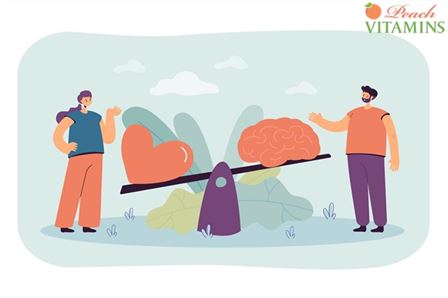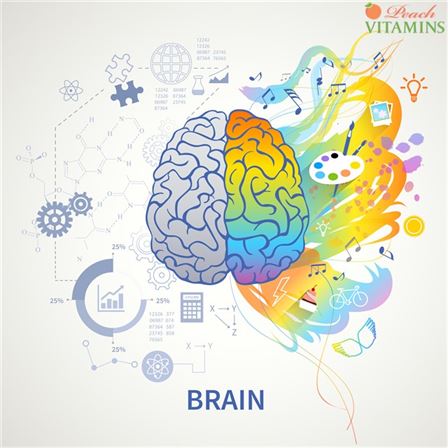Adults with attention deficit hyperactivity disorder (ADHD) often struggle with their symptoms. They may find themselves constantly distracted, unable to focus, and unable to complete tasks.
While prescription medications can treat adult ADHD, there are also natural ways to treat it. One of these natural treatments is L tyrosine. It has been used for decades to treat ADHD and other conditions.
This article will explain what L tyrosine is, how it works, and how to treat adult ADHD naturally.
L-Tyrosine Benefits Adhd – Does Tyrosine Increase Dopamine?
Tyrosine is a natural anti-adrenal supplement that improves memory and alertness and treats ADHD. It may improve alertness and attention disorders in people who do not have attention deficit disorder.
Tyrosine is a natural amino acid that is needed to make certain neurotransmitters in the brain. These neurotransmitters include dopamine, epinephrine (adrenaline), and norepinephrine (noradrenaline).
Monoamine amino acid precursors like tyrosine help produce more monoamines in the body. Monoamines are chemicals that play essential roles in your nervous system. Dopamine plays a role in motivation and reward; noradrenaline or adrenaline regulates stress responses, and precursors of serotonin promote sleep.
The synthesis of serotonin and selective serotonin reuptake inhibitors requires both tryptophan and tyrosine. The conversion of tryptophan to 5HTP occurs only after the ingestion of protein-containing sufficient amounts of tyrosine.
Tyrosine intake exceeds tryptophan requirements, increasing serotonin production.
Additional Benefits for Improving Brain Function
The benefits of L tyrosine come from its ability to boost the production of monoamines in the brain. When you take L tyrosine supplements, they enter the bloodstream and travel through the blood vessels to the brain, where they stimulate the release of monoamines. The result? You feel happier, calmer, less stressed out, and better able to concentrate.
Amino acid dosing values vary depending on age and weight. However, most adults should start at 200 mg per day divided into two doses taken one hour apart. Children under 12 years old need 50% fewer milligrams than adults because they metabolize food differently.
How Does L Tyrosine Work To Improve Attention And Focus In Adults With ADHD?
When you eat a protein diet, your body breaks down some of it into smaller molecules called free radicals. Free radicals cause damage to cells throughout the body. If too many free radicals build up inside our bodies, we become sick. We call this oxidative stress.
Amino acid precursors like L tyrosine work to reduce oxidative stress in the body. Oxidative stress occurs when free radical activity increases beyond normal limits. As long as free radicals remain within safe ranges, they keep us healthy. But if they get too high, they can lead to cell death.
Oxidative stress causes problems in several parts of the body, including:
• Brain – Increased oxidative stress leads to decreased function in areas of the brain responsible for learning, memory, and concentration.
• Heart – High levels of oxidative stress contribute to heart disease and stroke.
• Immune System – A weakened immune system makes you vulnerable to infections and diseases.
Addressing Attention-Deficit/Hyperactivity Disorder in Adults
Attention deficit hyperactivity disorders, affect adults just as much as kids. Symptoms include difficulty concentrating, being restless, having trouble staying focused, and acting impulsively. Some common signs of adult ADD/ADHDAdditional information about ADD/ADHD in adults may be helpful to understand how these conditions affect individuals.
Adult ADD/ADHD tends to run in families. About 20 percent of those diagnosed with ADD/ADHD also have another family member affected. Genetics seems to play a big part in developing ADD/ADHD.
This disorder with hyperactivity usually starts before adulthood but continues after puberty. Most cases are mild or moderate; however, severe forms do occur. There is no cure for ADD/ADHD. The goal of treatment of attention deficit focuses on managing symptoms so patients can live more productive lives. Medications used to treat ADD/ADHD include stimulants and antidepressants. Other therapies include behavioral therapy and counseling.
The disorder with monoamine amino acids is not considered a separate condition. However, monoamine amino acids help regulate certain chemicals in the brain that are important for controlling impulses. The most commonly prescribed monoamine amino acid is L tyrosine.
Adult Attention-Deficit/Hyperactivity Disorder – Autism Spectrum Disorder
The autism spectrum disorder, also known as ASD, is characterized by social communication difficulties and repetitive behaviors. Individuals with this disorder tend to engage in restricted interests and activities. These characteristics make it difficult for them to interact socially.
There is some evidence that the ketogenic diet may help reduce symptoms of autism. A recent study published in the journal “Autism Research” found that autistic children who followed a ketogenic diet had improved language skills and reduced repetitive behaviors.
Hence, adults who have autism should consider following a keto diet plan. This defiant disorder causes problems at school and work because they cannot communicate well enough to get along with others.
Ketoacidosis occurs when there isn’t enough insulin circulating in your bloodstream. Insulin allows glucose to enter cells where energy is needed. When you don’t produce enough insulin, sugar builds up in your bloodstream, causing ketoacidosis.
How Does L Tyrosine Work In The Body?
There are two types of receptors in the human body. One type responds to hormones, while the other reacts to nutrients. When food enters the digestive tract, enzymes break down proteins into small pieces called peptides. These peptide fragments enter the bloodstream, where they bind to specific receptor sites located on nerve cells.
The peptides stimulate nerves to release various neurochemicals, including endorphins, enkephalins, and gamma-aminobutyric acid. GABA influences sleep patterns. The endorphins are good at handling feelings of pleasure and pain. They help relieve pain and make you feel better.
When we eat carbohydrates, our bodies convert them into glucose. Glucose then travels through blood vessels to different parts of the body.
When you consume too many carbohydrates, too much glucose builds up in the bloodstream.
Understanding Carb Intake and Dopamine Production
Levels of tyrosine rise if carbohydrate intake increases. As a result, tyrosine binds to its receptor site on neurons, increasing their activity. Increased neuronal activity leads to increased production of dopamine levels, epinephrine, and norepinephrine.
As a neurotransmitter, dopamine regulates movement, motivation, reward, learning, memory, and emotions. The amine norepinephrine stimulates breathing and heart rate as well and results in an adrenaline rush.
It’s responsible for waking us up during times of stressful conditions. All three neurotransmitters play a role in maintaining normal mental function.
When tyrosine binds to these receptor sites, it activates the enzyme dopa decarboxylase. A combination of tyrosine and GABA produces inhibitory effects on brain tissue.
Thus, tyrosine can treat anxiety disorders and treatment of depression. Tyrosine for depression is available online.
In addition to improving concentration and reducing anxiety, tyrosine improves motor coordination and balance. Because it boosts metabolism, tyrosine reduces appetite. Hence, people who follow a low carb or ketogenic diet often use tyrosine supplements to maintain a healthy weight.
Improving Cognitive Performance
Attentional performance and mental performance decline over time as we age. However, this doesn’t have to happen. By using tyrosine supplements, cognitive flexibility functions can remain sharp throughout life.
Tyrosine promotes growth hormone secretion. Growth hormone plays a vital role in cell division and repair. Therefore, it keeps muscles strong and bones flexible. Additionally, it enhances immune system functioning.
Because tyrosine supports the nervous system, it also benefits those who experience chronic fatigue syndrome.
Anaerobic performance declines with age. Aerobic capacity decreases at a faster rate than anaerobic capacity. The reason why? Aerobic exercise requires more energy than anaerobic exercises. With age comes decreased stamina and endurance.
The good news is that there are ways to boost your athletic performance, so you don’t lose out on any potential health benefits associated with regular exercise. You need to know how to do it right!
L-Tyrosine Supplementation – One Of The Best Nutritional Supplements Available Today
Tyrosine supplementation has proven effective in treating ADHD. Studies show that individuals who take tyrosine exhibit improvements in concentration, alertness, and overall performance.
Additionally, studies suggest that tyrosine may help reduce cravings for carbohydrates. When taken together, these findings indicate that tyrosine supplementation could provide significant benefits to anyone struggling with hypertension, migraines, and other conditions.
Hormones produced in the adrenals regulate blood pressure and blood cells.
Adrenaline and noradrenaline stimulate red blood cell production while cortisol inhibits it. Cortisol is released when we’re stressed. If our body experiences too much acute stress, then cortisol will spike, causing blood vessels to constrict. Blood flow becomes restricted, leading to high blood pressure.
Damage to arteries and veins results from high blood pressure. This causes the arteries to stiffen and become less elastic. Veins get thicker and more complex as well.
Both arterial stiffness and vein thickening contribute to poor circulation. These changes lead to clogged capillaries and reduced oxygen supply.
Blood spot concentrations of insulin, glucose, cholesterol, triglycerides, and HDL cholesterol decrease with age. LDL cholesterol increases. All of these factors contribute to cardiovascular disease.
How To Take L-Tyrosine: Dosage And Timing
It is important to note that each person will respond differently when taking L-tyrosine. If you break down nutrients into smaller pieces, your body is better able to absorb them. That means that some people might require higher dosages while others would benefit from lower doses.
The recommended daily dose of tyrosine varies between 500 mg and 2000 mg per day. People with kidney disease should consult their healthcare providers before using tyrosine supplements.
Why Should People Take L Tyrosine Supplements To Treat Adult ADHD?
People with ADHD often struggle with poor impulse control, hyperactivity, and trouble focusing their thoughts. They find themselves easily distracted and unable to complete tasks without losing track of time. Many of them experience anxiety, depression, and low self-esteem due to their inability to manage emotions effectively.
In conclusion, I would like you to know that there are many different ways to treat adult ADHD. Some people take medication while others try supplements or alternative therapies. The best way to determine what works best for your needs is to talk to your doctor. If you have any questions regarding this topic, please feel free to contact me at (404) 266-9115.
FAQs for L Tyrosine For Adhd
How Long Does It Take For L-Tyrosine To Work?
L-tyrosine is a natural amino acid found in the body. It helps the brain produce dopamine, a neurotransmitter that plays a role in mood, motivation, attention, and learning. The effects of l-tyrosine usually last for about 4 hours, but some users may experience longer results.
Some people report feeling sleepy, dizzy, or having headaches after taking this dose. If you notice any side effects, stop using the supplement and talk to your doctor.
What Should I Avoid While Taking L-Tyrosine?
L-tyrosine is a natural amino acid found in foods such as peanuts, egg yolks, and mushrooms. It has been used for decades as a dietary supplement to boost memory and concentration. However, some studies suggest that taking too much L-tyrosine may cause headaches, nausea, and other side effects. If you experience any of these symptoms, stop taking L-tyrosine immediately.
Mixing medications is also not encouraged because it can result in serious health problems. Talk to your pharmacist if you suspect that you’ve taken more than one type of prescription drug. You could be experiencing interactions between two drugs that weren’t meant to work together.
Youngsters with ADHD often don’t receive best treatment
Source: (scopeblog.stanford.edu)
Dogs can develop ADHD just like humans
Source: (studyfinds.org)
[wps_products product_id=”6618198376483″ html_template=”product.php”]








